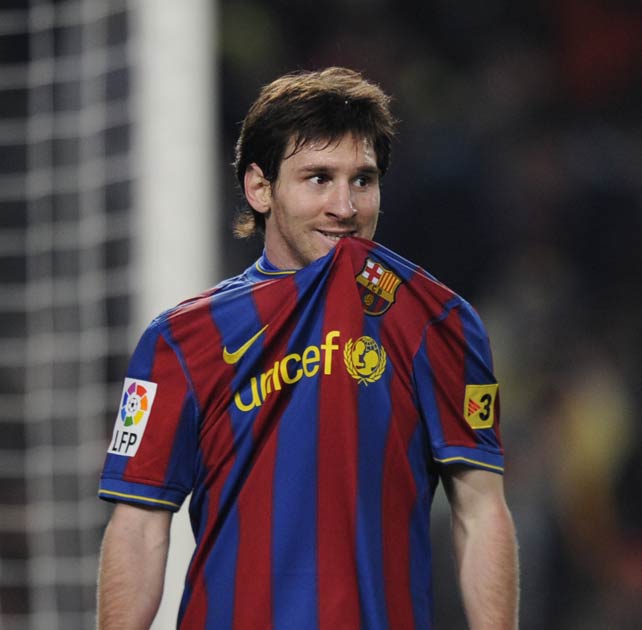Lionel Messi: A rare talent

Your support helps us to tell the story
From reproductive rights to climate change to Big Tech, The Independent is on the ground when the story is developing. Whether it's investigating the financials of Elon Musk's pro-Trump PAC or producing our latest documentary, 'The A Word', which shines a light on the American women fighting for reproductive rights, we know how important it is to parse out the facts from the messaging.
At such a critical moment in US history, we need reporters on the ground. Your donation allows us to keep sending journalists to speak to both sides of the story.
The Independent is trusted by Americans across the entire political spectrum. And unlike many other quality news outlets, we choose not to lock Americans out of our reporting and analysis with paywalls. We believe quality journalism should be available to everyone, paid for by those who can afford it.
Your support makes all the difference.When Pep Guardiola took over from Frank Rijkaard at Barcelona 18 months ago, Lionel Messi's favourite local steakhouse in the city's affluent Sarria-Sant Gervasi neighbourhood was right at the top of his 'to do' list.
The rookie coach was under no illusions about the size of the task in front of him and the numerous issues he needed to sort out, with Messi's fitness being at the top of his agenda.
Since then, Barca have won a sublime clean sweep of trophies and the diminutive Argentinian has developed from a highly-skilled one-trick pony into the world's finest and most influential player, culminating in his receipt of the coveted Ballon d'Or prize awarded to the European player of the year.
Under the increasingly laid-back Rijkaard there had grown an element of player power that Guardiola knew was cancerous.
The lack of professionalism and indiscipline of talented talismen Ronaldinho and Deco had spread dangerously, ultimately ripping apart Rijkaard's much-revered Camp Nou dynasty and threatening to do more lasting damage to their Argentinian superstar.
The shy, homely Messi had naturally sought comfort in the bosom of his two team-mates and sub-consciously drifted into the clique and away from the rest of the squad.
Guardiola, in his first senior managerial position, got rid of the ringleaders almost immediately. Both Ronaldinho and Deco were offloaded to AC Milan and Chelsea respectively for cut-price fees.
The Catalan coach, schooled under former Barca boss Johan Cruyff, was quick to make his mark as a strict disciplinarian, imposing fines and punishments for even the slightest infringement of a new code of conduct designed to right the wrongs so regularly committed under Rijkaard.
With his old mates out of the picture, Messi was 'rebuilt' under Guardiola, who forced him to interact more with all of his team-mates, to think like a leader on and off the field and to improve himself physically.
Because while the humble boy from Rosario did not share Ronaldinho and Deco's reported penchant for nightclubbing until the early hours, he did share the questionable physique which had become the trio's trademark.
Incredibly fussy about his food since childhood, Messi had somehow spent his career under Rijkaard - a period during which he emerged from the youth system to the pinnacle of the game - dining almost exclusively on steak and cola at his local Argentinian restaurant.
Unfortunately for the modest little 'Las Cuartetas' steakhouse - a favourite with South American players from both Barca and city rivals Espanyol - Guardiola's ascension to first-team coach put a serious dent in their profits.
Some of those impressed with Guardiola's magnificent first year in charge joked that weaning Messi off his unhealthy diet has been his biggest achievement.
Indeed, the change in coach coincided with Messi's improved physical condition and best season to date as the Catalans won an unprecedented treble of league, cup and Champions League.
Messi was already the finest dribbler in the game when Guardiola arrived, capable of awe-inspiring runs not seen since the days of his hero Diego Maradona. But as the cracks emerged in Rijkaard's once-mighty side, question marks arose about the little Argentinian's all-round game.
While the twinkle toes took the plaudits and the amazing solo efforts proved as crucial as they were brilliant, observant commentators were left to question his abilities beyond that.
Too often his passing was wayward, his vision seemingly extending only as far as the ball in front of him. His crosses were too infrequent and too inaccurate. His shooting was poor, with the vast majority of his goals scored from close range in one-on-one situations. His right foot was non-existent.
Harsh criticism, perhaps. After all, he was close to being the best player in the world despite these supposed inadequacies.
But Guardiola's arrival and obsessive attention to detail has helped Messi overtake Cristiano Ronaldo as the world's finest.
His improved condition has led to his first largely injury-free season last year. His new-found tactical awareness has enabled him to flourish in the playmaker role, roaming wherever necessary to combine incredible dribbling technique with a more tangible creative spark.
In the 2007-08 UEFA Champions League semi-final against Manchester United, Messi's performance perfectly encapsulated the problems under Rijkaard. While Barca dominated possession and he wowed Old Trafford with his effervescence on the ball, the Catalans were ultimately toothless and limped out feebly with a 1-0 aggregate defeat.
The sides met again in May, this time in the Champions League final, this time with the 'new' Messi. And the little marvel duly capped a fine season with the second goal as Guardiola's team outclassed United on the night to complete their historic treble.
Now, in winning the prestigious Ballon d'Or, Messi has been given the accolade his talent so clearly deserves. And there's little doubt where he will go to celebrate when he gets home.
Join our commenting forum
Join thought-provoking conversations, follow other Independent readers and see their replies
Comments